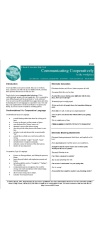They usually do the most repetitive job tasks. They answer the phones, keep things organized, keep track of finances, make sure you have what you need when you need it, and are often the first contact a customer or member of the public has with your organization. They are also often the lowest paid people in your organization and often not completely involved or included in many events that happen in your office. Oddly, they may be the most knowledgable people in your organization about what really goes on, and, because of their contact with clients, can have great insight into their needs, wants and expectations.
Sadly, support and administrative staff are often under-used and under included, and that creates several problems. Staff turnover can be higher than for other positions because the work may not be made satisfying enough, or interesting enough, since it is often repetitive. Support/administrative staff tend to have less formal authority and can become frustrated and less effective. But as important as the costs associated with turnover, administrative staff who are marginalized in the workplace cannot contribute their unique knowledge to the health of the organization. And then everyone loses. Who best, for example to be involved in improving an organization than the people who are involved in many of the processes and functions in an intimate way? Who best to suggest ways to improve service than those people directly providing that service?
We are going to suggest a number of ways to support your support staff so that they can function as full, integral and critical parts of your organization and team.
Job task rotation is one way of removing the tedium of repetitive administrative job tasks, while providing staff with the opportunity to learn new skills and exercise new responsibilities. This may be particularly important for people who answer the phone in high call volume offices, and have little sustained contact with people who call. Job task rotation can help avoid burnout from the high volume and allow recharging of batteries.
Providing personal and professional development opportunities is very important. These opportunities can help support staff contribute more fully in organizational life by developing skills that have sat dormant as a result of restrictive job tasks. For example, a person who does a great deal of regular typing or keyboarding might be a good candidate to learn desktop publishing skills that the organization may need to produce brochures and printed material.
Development and training without the opportunity to use the new skills is often a waste. If the person who goes to and learns desktop publishing skills returns to a job where those skills are not used, the skills will be lost, and frustrations will INCREASE. Focus development on skills that can be applied in the workplace.
Inclusion is very important. Staff meetings for example should, at minimum allow support staff to attend if they wish, even if the issues to be discussed are not directly germane to their specific jobs. Their involvement serves several purposes. First, it helps them understand their jobs within the larger context of what the organization is to achieve, and how their jobs relate to others in the department. Second, support staff can provide valuable insight from a different perspective; a perspective that may be very useful to decision-makers who have a different set of experiences in the workplace.
Many support staff have not had the experience of being full members of the organization (i.e. being asked to participate and contribute, make decisions, etc.). Keep in mind that they may not be comfortable jumping into group conversations and feel somewhat intimidated. Some effort should be made to invite them into conversations so that they have the chance to learn that their unique perspectives are valued by others. However, it is probably unfair to pressure people into participating in areas where they don’t feel comfortable. Full participation doesn’t work when it is mandatory.
Information flow is very important. It is not uncommon for information about issues to bypass support staff. If staff do not have the information equally, they cannot choose to participate in decision-making functions. Even when information does not directly affect administrative staff, they should have equal access to the information. Restricting the flow of information restricts contributions.
It is important that management create a climate of respect for support and administrative staff. There is still a legacy attitude that support staff are meant to be told what to do, and sometimes this attitude can result in excessive demands made upon administrative staff in disrespectful ways. Management has a role in making it clear that ALL staff (and their work) is important, and that all staff must be treated politely and with respect.
Full participation requires that support staff need to be allowed the time to do so. Most support staff have limited “discretional time”, particularly those that deal directly with the public in person or on the phone. Their jobs can literally tie them to their desks. One strategy for dealing with this is to have other staff (non-support) “fill-in” to help (answer phones, etc) for periods of time to allow support staff to do something else. This has the added benefit of helping other staff better understand the jobs of support staff, and can foster increased respect for them.
Support staff (like any other staff) have different contributions to make, and different preferences as to how they might like to contribute. Some staff will not want to be involved in issues not directly related to their job tasks. Some will jump at the chance. It is important that these preferences be understood and taken into account. Forcing people to attend every meeting when they would rather be doing the formal aspects of their jobs can be counter-productive. Participation should be negotiated, and managers and supervisors can begin the dialogue during regular meetings with individuals. Two questions that might be useful:
Is there anything you can think of that would make your job more interesting or satisfying?
How do you feel about being more involved in [areas, processes, other tasks]?
Finally, and perhaps most importantly, look for areas where decision-making can be delegated. One of the difficulties with support staff positions is that they may have little involvement in any decision-making, even decision-making that directly affects them and their work. However, delegation of decision-making needs to be done so that staff have the tools and information to make good decisions. Expecting people to act in an empowered way without providing them with the information they need to do so successfully is unfair, and very harmful.
Conclusion
The difficulties in keeping support staff healthy and contributing arises in part from the nature of the job tasks. However, another major part of it is how support staff are treated and perceived. Step out of the box. Consider administrative and support staff as untapped resources that often have a different set of insights about the work that needs to be done. Organizations can benefit by tapping this resource, and increase innovation, by helping support staff become better integrated into the total functioning of the department.






